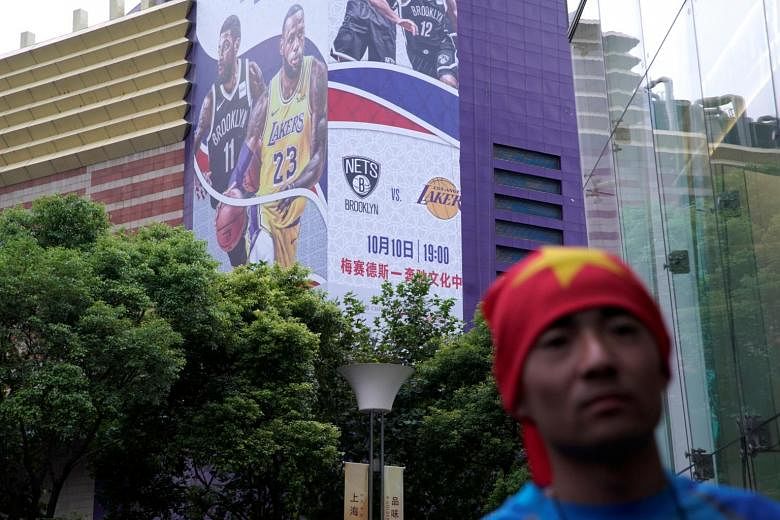SHANGHAI (BLOOMBERG) - Chinese companies, celebrities and broadcasters are lining up to cut their ties to the National Basketball Association (NBA), but one thing may stand in the way of Beijing's confrontation with the league: 500 million Chinese basketball fans.
The NBA is drawing outrage in China after Commissioner Adam Silver defended freedom of expression, signalling that the league won't back down in the face of criticism over a tweet by the Houston Rockets' general manager Daryl Morey supporting the Hong Kong protests.
The stand-off is dividing Chinese basketball fans torn between their love for the game and a desire to support China's sovereignty over its territories as it faces criticism from the West.
The choice isn't as clear cut as with other cases, where China targeted foreign companies, as the NBA has played a central role in creating and stoking a deep love for basketball in the country.
Unlike Italian fashion house Dolce & Gabbana, or Hong Kong airline Cathay Pacific Airways - companies that have drawn the ire of increasingly nationalistic consumers - the NBA has near-universal household recognition in China, and no obvious substitute for Chinese sports fans.
Mr Tang Yuan, a Rockets fan whose favourite player is James Harden, is conflicted by the controversy.
"I still love basketball," the 17-year-old student said outside an Apple store in Shanghai. "I appreciate the NBA as the main contributor to world basketball development. But as a stand on something so sensitive, I can't agree on that, their words."
Mr Tang said he will take a break from the NBA and wait for things to play out. "There are other sports I like, like football and badminton," he said.
Mr Yu Chen, a teacher at the Beijing University of Posts and Telecommunication and a Chicago Bulls fan, also won't watch NBA games, even if the league apologises.
"If you come out now and say sorry, do you really think people will consider you sincere?" asked Mr Chen, who was playing basketball with students during a break.
But for Miles, a 17-year-old who would only give his first name, the fracas has gone too far and won't stop him from watching NBA games.
"I think the backlash is too much," he said in a Starbucks in Shanghai. "If someone says something in the United States you don't like, I don't think it involves calling your embassy. What's the point? It's just one guy on Twitter."
DEEP ROOTS
Basketball has deep roots in China, introduced by a YMCA missionary more than a century ago. About 300 million Chinese play the game, giving the country a fan base almost as big as the entire US population.
Tencent Holdings, which holds local digital broadcast rights, said 490 million users watched one or more games on its platforms in the 2018-19 season, triple the number from four years ago.
The NBA was one of the most influential organisations to bring a piece of American culture to China. The first game was broadcast in 1986 on state network CCTV, and millions of Chinese people were soon mesmerised by stars like Magic Johnson at a time when the Chinese economy and society were otherwise still shut off from the outside world.
The NBA's image in China was bolstered further after Yao Ming was drafted in 2002. The 2.28m centre for the Rockets was described as the biggest Chinese export to the US, and the league's popularity exploded in China with the addition of a hometown hero.
When the first NBA pre-season game in China was held in 2004, tickets sold on the black market for as much as 2,000 yuan, at a time when the average monthly salary in China was 1,300 yuan.
Chinese fans were so enamored of NBA stars that during the 2008 Olympic games in Beijing, they chanted "USA, USA, USA" during games played by the US team that featured Kobe Bryant and LeBron James.
The Rockets tweet controversy isn't the first political rift to threaten NBA games. Broadcasts were suspended for several months in 1999 after US bombs hit the China embassy in Belgrade, killing three Chinese journalists. Other halts took place in 2001 and 2008, sparked by geopolitical conflicts like tensions over the South China Sea.
If the US league becomes more ostracised in China because of the latest incident, some say the Chinese Basketball Association, now led by Mr Yao, could fill the gap.
"Chinese basketball players have learnt from the NBA," said Mr Jim Xue, a sports trainer who was coaching a basketball team at Beijing Normal University. "They've learnt enough and can play quite well. Now could be an opportunity for CBA, if basketball fans turn to watch it."
Mr Xue added that national sovereignty is a red line for Chinese people. "You can't separate sports and politics," he said.
Mr Allen Li, an 18-year-old at a mall in downtown Shanghai, said he was disappointed by the Morey tweet. He has a ticket for the NBA games scheduled for Thursday in Shanghai, but says he might not have bought it if the Rockets tweet incident had occurred before his purchase.
But the fracas may be a boon for one NBA team.
Mr Li bought a Brooklyn Nets T-shirt on Wednesday - the team was recently bought by Mr Joe Tsai, the Taiwan-born co-founder of Chinese e-commerce giant Alibaba Group Holding.










